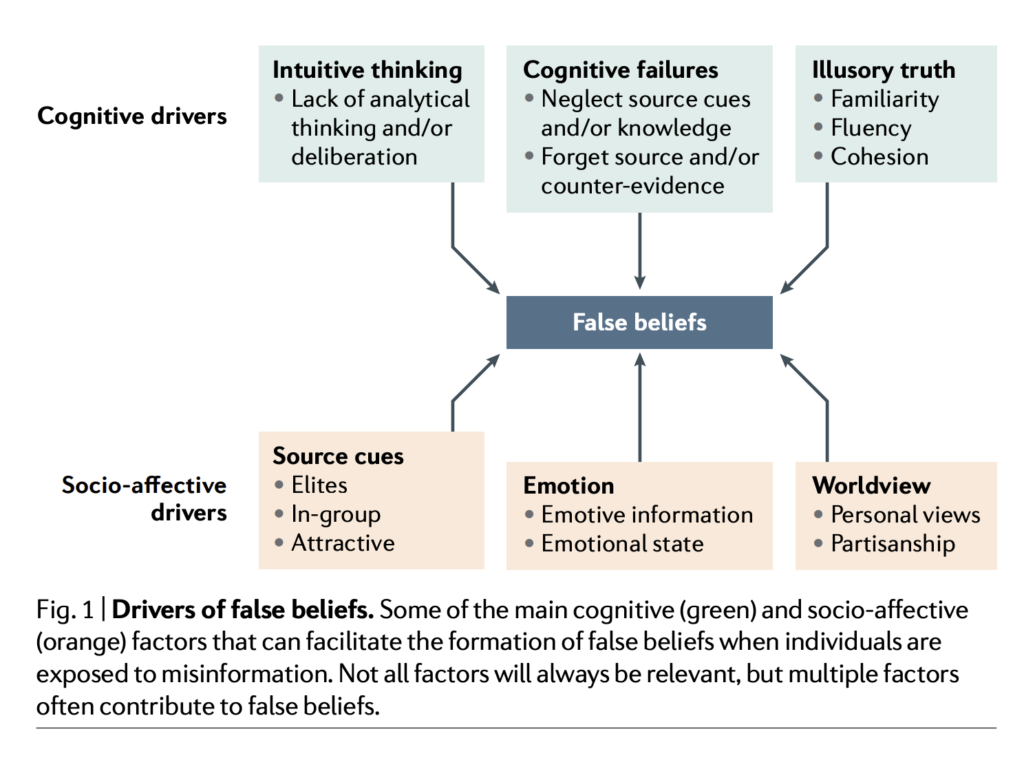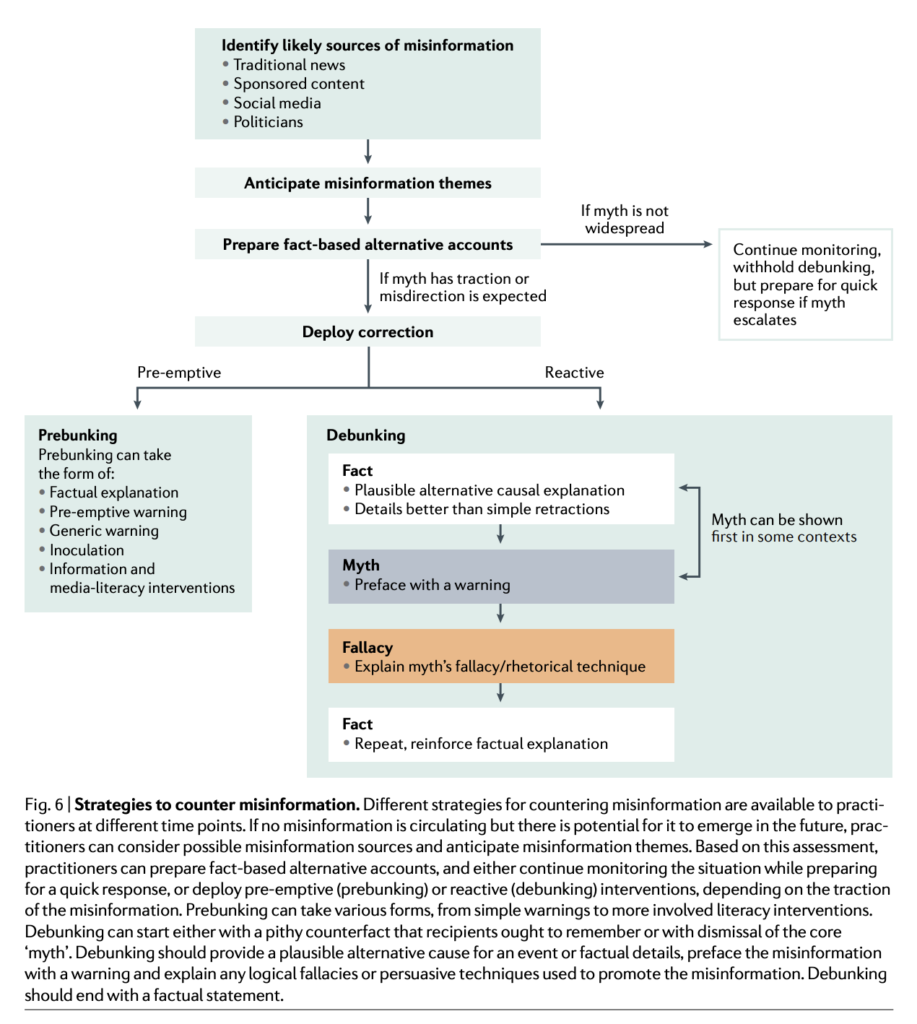Why people believe misinformation and resist correction
Justin Hendrix / Jan 14, 2022From COVID-19 and vaccine conspiracies to false claims around elections, misinformation is a persistent and arguably growing problem in most democracies. In Nature, a team of nine researchers from the fields of psychology, mass media & communication have published a review of available research on the factors that lead people to "form or endorse misinformed views, and the psychological barriers" to changing their minds.
Acknowledging that "the internet is an ideal medium for the fast spread of falsehoods at the expense of accurate information," the authors point out that technology is not the only culprit, and a variety of interventions that have sought to solve misinformation by addressing the "misunderstanding of, or lack of access to, facts" have been less than effective. The so-called "information deficit model," they argue, ignores "cognitive, social and affective drivers of attitude formation and truth judgements."
The authors are particularly concerned with the problem of misinformation as it concerns scientific information, such as on climate change or public health matters. In order to better understand what can be done to address the problem, they look at the "theoretical models that have been proposed to explain misinformation's resistance to correction" and extract guidance for those who would seek to intervene. Then, the authors return to "the broader societal trends that have contributed to the rise of misinformation" and what might be done in the fields of journalism, education and policy to address the problem.
The authors summarize what is known about a variety of drivers of false beliefs, noting that they "generally arise through the same mechanisms that establish accurate beliefs" and the human weakness for trusting the "gut". For a variety of reasons, people develop shortcuts when processing information, often defaulting to conclusions rather than evaluating new information critically. A complex set of variables related to information sources, emotional factors and a variety of other cues can lead to the formation of false beliefs. And, people often share information with little focus on its veracity, but rather to accomplish other goals- from self-promotion to signaling group membership to simply sating a desire to 'watch the world burn'.

Barriers to belief revision are also complex, since "the original information is not simply erased or replaced" once corrective information is introduced. There is evidence that misinformation can be "reactivated and retrieved" even after an individual receives accurate information that contradicts it. A variety of factors affect whether correct information can win out. One theory looks at how information is integrated in a person's "memory network". Another complementary theory looks at "selective retrieval" and is backed up by neuro-imaging evidence.
Other research looks at "the influence of social and affective mechanisms" at play. These range from an individuals assessment of "source credibility" to their worldview-- the "values and belief system that grounds their personal and sociocultural identity." Messages that threaten a person's identity are more likely to be rejected. Emotion plays a major role- from the degree of arousal or discomfort information might generate to the extent to which it might cause an "emotional recalibration" to account for it.
The authors identify three general types of corrections. They include fact-based corrections that address "inaccuracies in the misinformation and provides accurate information," those that identify logical fallacies in the misinformation, and those that "undermine the plausibility of the misinformation or credibility of its source." These corrections can be applied before the introduction of misinformation (pre-bunking) or after (de-bunking), and best practices for both approaches have begun to emerge, including methods to inoculate individuals to misinformation before they are exposed to it and how to pair corrections with social norms. These best practices are generally applicable in a social media environment, but there are some nuances, particularly on platforms where interventions may be observed by others and could be "experienced as embarrassing or confrontational."

The emerging science of misinformation points to a number of important implications, including for practitioners such as journalists as well as for information consumers. But the authors see the limitations of both groups, which is where policymakers come in. "Ultimately, even if practitioners and information consumers apply all of these strategies to reduce the impact of misinformation, their efforts will be stymied if media platforms continue to amplify misinformation," they say, pointing to both YouTube and Fox News as examples of companies that appear economically incentivized to spread misinformation.
The job of policymakers, in this context, is to consider "penalties for creating and disseminating disinformation where intentionality and harm can be established, and mandating platforms to be more proactive, transparent and effective in their dealings with misinformation." Acknowledging that concerns over free speech must be weighed and balanced against the potential harms of misinformation, other policy recommendations include:
- That "companies should be encouraged to ban repeat offenders from their platforms, and to generally make engagement with and sharing of low-quality content more difficult";
- Paying attention to how "undue concentration of ownership and control of both social and traditional media facilitate the dissemination of misinformation";
- Helping "support a diverse media landscape and adequately fund independent public broadcasters";
- Making "substantial investment in education, particularly to build information literacy skills in schools and beyond";
- And interventions that address norms, such as those "targeted more directly at behaviour, such as nudging policies and public pledges to honour the truth".
Notably, the authors suggest broader interventions to strengthen trust may yield results in the fight against misinformation, such as "reducing the social inequality that breeds distrust in experts and contributes to vulnerability and misinformation."
Having reviewed the literature, the authors also offer their recommendations for future research, including larger studies, better methods, longer term studies, more focus on media modalities other than text, and more translational research to explore "the causal impacts of misinformation and corrections on beliefs and behaviors." Ultimately, what is needed is more work across disciplines, particularly at the "intersection of psychology, political science and social network analysis, and the development of a more sophisticated psychology of misinformation."
Authors
